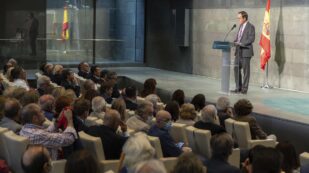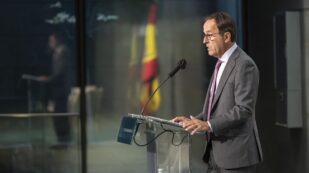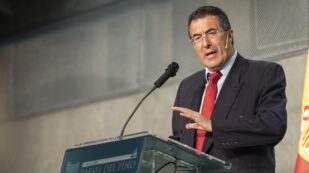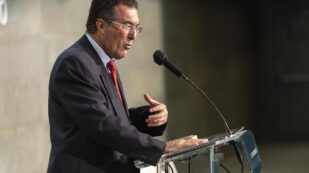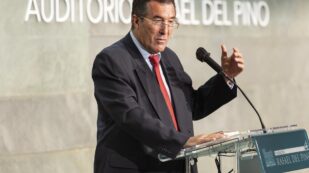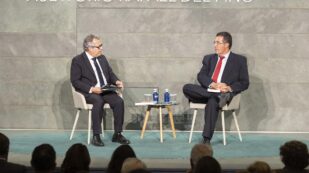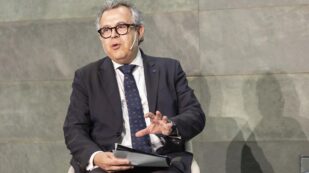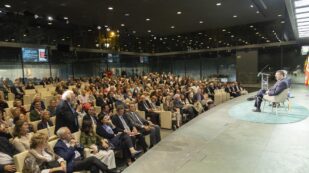Marcelo Gullo and Manuel Lucena Giraldo
Summary:
On 10 October 2022, the Rafael del Pino Foundation organised the face-to-face dialogue "The Spanish legacy in the face of Spain's enemies", with Marcelo Gullo, professor at the National University of Lanús and founding member of the Manuel Dorrego Institute for National and Ibero-American Historical Revisionism.
The black legend is hegemonic in the world's universities, with notable exceptions. The black legend is the false history of Spain told by Spain's enemies, first Holland, then England, then the United States, even the Soviet Union. This legend speaks of violence, death, murder and gold stolen from America.
If Spain was only interested in gold, why did it decide to found a string of universities in America? If it is only interested in America to go and steal and plunder, if it is a murderous, raping power, why does it decide to found universities? It's a strange thing. It's going to steal and it decides to found eighty-odd universities. Eighty-odd years before Harvard University was founded, the University of San Marcos was founded in Lima. It was semi-free, but with scholarships for the poorest. The Indians and mestizos went there because the Spaniards who arrived there began to mesticize. A power that goes to a place to rob, kill and murder founds ports because it knows it has to flee as soon as possible before there is a popular revolt and it throws them out.
Spain has sown a string of universities in forty years, from Santa Fe in Colombia to Cuenca in Ecuador, Quito, Ayacucho, Cochabamba, Cajamarca, Sucre, La Paz, the cities of San Salvador de Cujuy and Salta, Tucumán, Córdoba, all in the interior, far from ports to escape to. America is not Spain, so a city in the interior like Cordoba is 1,200 kilometres from the sea and is separated from the sea by gigantic mountains that are almost 6,000 metres high. If someone founds a university there, it is not to escape, but to stay. Why?
Spain, too, has the idea of founding a string of hospitals. Why, if it is going to steal, why does it found free hospitals? Health care in Lima was absolutely free, whether for whites, Indians, mulattos, blacks, poor or rich. All they had to do was go to the hospital to be treated. Some people said that these hospitals must be horrible. But not so much, because rich people from Europe travelled to Mexico to be cured because quinine was discovered in Peru and Ecuador. When malaria could not be cured anywhere in the world, it could be cured in the hospitals of Peru and Ecuador.
Spain also founds schools, the Colegio San Pablo in Lima has four thousand books in its library, while Harvard has four hundred. Why would a power that is going to kill have the idea of bringing in a printing press? A hundred years before there is a printing press in Anglo-Saxon America, books are already being printed in Mexico. Why? Why? What is the point? Why would that power that is going to kill think of taking the Quechua language, take the Nahual language of the Aztecs and tell them I am going to teach them to write in their own language and teach them their own grammar? Fifteen years before English grammar existed, Spain, with its priests, had already created the Nahual grammar. Why? Everyone would have noticed it if it weren't for prejudice. Why does Spain send its best teachers? Cervantes himself enlisted to go to America. He couldn't go, but he enlisted for it.
But there is something even more relevant. In those universities, which were Law, Theology, Medicine, they studied something very special, Political Theory. A Political Theory that had emerged from the historical entrails of Spain, because Spain was nothing more than the conclusion of the famous three hills: the hill of Rome, the hill of Jerusalem and the hill of Athens. From Spain's entrails came a Political Law that was already crazy to study in Europe, and it was crazy to study and teach it in America, which was supposedly a colony. That political law said that power comes from God. Everybody was saying it. The French or the English school of political theory said it. But the Spaniards added something to it. Francisco Suárez, from the School of Salamanca, sent his best disciples to America, who said that power comes from God, but he gives it to the people. The people delegate it to the king because he is their father, and the king must exercise power like a father. What happens if he doesn't? Well, political theory explained that the people had the right to revolution, to remove the king. What's more, Juan de Mariana said that they had the right to tyrannicide because the father king had become a tyrant. What colonialist power, which only thinks of killing, would think of teaching Indians, mestizos, that the king is a father, but that if he is not a father they can throw him out? It has never happened in the history of mankind. Why? Socrates already said that the question is worth more than the answer, the art of giving birth to ideas with the question.
Spain's enemies did not let us reflect on why, because they created the black legend. They formed a court of history whose hands are stained with blood, made up of France, England, Holland, the United States and even the Soviet Union. If you go back in history, you find that in France, a small region in the north, the Vendée, is opposed to the revolution. The Paris Committee then decided that this region should be eliminated from French history, that its population should be exterminated. In some villages, 80% of the population were massacred. The men of the French army, revolutionaries, took Catholic women and children and threw them into bread ovens to be burnt, and enjoyed their screams. This is in the police reports of the revolutionary authorities themselves, who were disgusted and indignant at what these troops were doing. But France is the country of equality, freedom, tolerance and there is no black legend there. Everything is fine, everything is rosy.
England, came to America and said that the best Indian is the dead Indian. But it was worse in Austria. They came there and counted nine hundred thousand people, but then they got cold feet, said they were not human beings, they were zoology, and they put on the maps terra nulis. Why? Because, if they were not human beings, they could be eliminated. In Tasmania, not a single woman survived the genocide that took place there. Not to mention the English genocide of a tiny part of the English who imposed Anglicanism by blood and fire, hanging Catholics from church steeples. Characters like Churchill pass as great democrats. In the Second World War, England and its army needed food. So Churchill told them to bring rice from India for them, which caused the deaths of three or four million Hindus. The British authorities in India warned him, but Churchill replied that it was their fault because they were breeding like rabbits.
Why was Spain different? Why did it create universities and colleges? Why did it explain that different theory? Everyone says that Spain has to ask for forgiveness, all the political, secular and religious leaders. Why was Spain different? Because we are children of a great conscience, because Spain's work in America was not an enterprise, but a mission. A mission of the Spanish people, who poured into America with the best they had, founding towns, mixing with the Indians, sowing devotion to Mary, organising. America was forged by Spain, which dazzled it with its laws of the Indies, with Alfaro's ordinances, with the missionary conscience of Isabella the Catholic. These words come from a speech given at the University of El Salvador on 27 May 1975 by Father Jorge Mario Bergoglio, Provincial Superior of the Society of Jesus in Argentina.
Spain has nothing to apologise for, because Spain's work was a mission. Of course, mistakes were made, and many sins were committed, because when Spain does something it does it in a big way. But if the tree allows us to see the forest, we will see that the previous world was a terrible world of fantastic cruelties. A world that when Cortés arrived on Mesoamerican soil, what we now consider Mexico, there was an anthropophagous imperialism that took the lives of twenty thousand people every year, according to Prescott, who does not dare to say that the figure of one hundred and fifty thousand is false. Spain did not conquer Mexico. José Vasconcelos, prime minister of the Mexican revolution when he was still a socialist and Marxist, said that the conquest was made by the Indians, fed up with the anthropophagous Aztec imperialism, who accompanied Cortés with two or three hundred thousand men.
Spain was different not only because it was Catholic. Portugal and France were also Catholic and the Portuguese made disasters in Brazil and the French in their colonies. Look at Africa: where are the universities, the hospitals founded by France in Africa? It was different because there was a wonderful woman, Isabella the Catholic. It is the imprint of Isabella that tells the Spaniards that these people, whom she barely intuits, will never be slaves. They will be free people. Portuguese law authorised Portugal to enslave them, but Spanish law did not. These territories will not be colonial territories either, but will be kingdoms on equal terms.
Did the Spanish people support Isabel's decision? Did the subsequent authorities support that decision? Yes. Why? Because Spain was different, since it had been forged by seven hundred years of struggle against the cruelest imperialism known to history. There was no tolerance in that imperialism that subjugated and conquered the Iberian Peninsula and took twenty thousand young virgin slaves to Damascus to serve there as sex slaves in the harems of the various chiefs. Spain faced this imperialism for seven hundred years, and this forged a very special personality. When Charles I arrived in Spain, at the age of 17, who had been educated in the principles of chivalry by his aunt, who had dealt with knights, but there were few knights in Europe, he realised that it was a people of knights. The Spanish were a brave, generous, loyal people, because they had been forged by seven hundred years of struggle against the cruelest imperialism in history that had taken their territory from them. These people supported Isabel's decision. That is why they did not make imperialism in America. That is why Spain's civilising work in America is unparalleled in the world.
Spain has nothing to apologise for. It left America the best it had, it did what it could.
The Rafael del Pino Foundation is not responsible for the comments, opinions or statements made by the people who participate in its activities and which are expressed as a result of their inalienable right to freedom of expression and under their sole responsibility. The contents included in the summary of this conference are the result of the debates held at the meeting held for this purpose at the Foundation and are the responsibility of their authors.
The Rafael del Pino Foundation is not responsible for any comments, opinions or statements made by third parties. In this respect, the FRP is not obliged to monitor the views expressed by such third parties who participate in its activities and which are expressed as a result of their inalienable right to freedom of expression and under their own responsibility. The contents included in the summary of this conference are the result of the discussions that took place during the conference organised for this purpose at the Foundation and are the sole responsibility of its authors.
